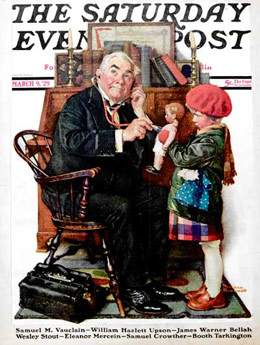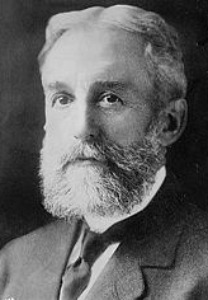Related Topics
Downtown
A discussion about downtown area in Philadelphia and connections from today with its historical past.

Curtis
To Cy Curtis, magazines were just vehicles for advertisers. In fact, his mags taught former farmers how to manage urban life, more or less accidentally creating a focus for American books, authors, politics and literature. The fall of his empire teaches the lesson that antitrust laws against vertical integration are probably unnecessary.
Literary Philadelphia
Literary
Tourist Walk in Olde Philadelphia
Colonial Philadelphia can be seen in a hard day's walk, if you stick to the center of town.
Curtis and the Book Trade

|
| The Saturday Evening Post |
Few seem to have commented much on the connection between the death of the Saturday Evening Post and the subsequent decline of the book publishing business. The Curtis Publishing Company published books, of course, but that's only a small part of the matter. The general-interest magazines, the Post in particular, were places where authors built their reputations, often long before they had started writing their books.
The Post would run eight or more long articles each week, and at least two serials. From the parochial point of view of the weekly magazine, a serial was a teaser, getting the reader interested and eagerly looking forward to the next installment and the next after that. Another way of looking at it, however, was as one very long piece, larger than a magazine article, but not as big as a book. Sometimes, an eight- or ten piece serial was longer than a small book. This was a wonderful incubator for new authors, and for advance publicity for established authors planning a forthcoming book on the same topic. The big magazines paid pretty well for articles, so writing for the Post was a good way for an author to support himself during the long famines between big books.

|
| Cyrus H.K. Curtis |
The general interest magazine wasn't designed for the purpose of supporting the book publishing industry, but it definitely evolved that way. With the disappearance, of not just the Post but of all general interest weekly magazines, the dynamics are now a lot clearer. A new author of a book today has a terribly difficult time establishing a name and a following. The striking thing is that the advent of the home computer has caused an enormous outpouring of new, excellent, manuscripts which cannot find a publisher because it's so hard to get a first-book author established. In 2006, over two hundred thousand new books were published, and many obscure titles were actually quite good books. With shorter print runs as the market gets splintered, the cost per book has skyrocket Dutch and German companies, plus a vast number of small self-publishing enterprises. Much of this sad phenomenon has been blamed on TV, or the Internet, or the school systems. You just can't get people to read and write, these days it is said, but don't believe it. There are dozens of books languishing today that would have competed very effectively with Hemingway and Dreiser and Aldous Huxley. What's much harder is to get a readership assembled for a new author without spending a king's ransom on hype and publicity; if you are going to invest that much money, the business imperative is to invest it on trash, because trash really will sell if you hype it enough. High-class literature is supposed to sell itself.
Every new author is shocked to discover that it takes a full year for his manuscript to wend its way into the bookstores if you can find a bookstore. It doesn't take that long to edit and design a book. It takes that much time to arrange the publicity, and pace its appearance for the book fairs, for the Christmas season, and the reviewers. You can give a free book to a reviewer who truly means to read it, but he may not read it for months. Most book distributors and sellers will not accept a book until they see what the reviewers say. It takes a long time, it costs a lot of money, and it often is unsuccessful. It's all pretty pathetic, compared with sending a chapter to the Saturday Evening Post, getting paid to put your author in front of ten million readers.
Originally published: Wednesday, June 21, 2006; most-recently modified: Monday, May 20, 2019
| Posted by: George Fisher | Dec 21, 2007 3:29 PM |
| Posted by: Michelle | Dec 20, 2007 7:00 PM |
| Posted by: George Fisher | Jul 5, 2007 11:55 AM |
| Posted by: Peggy Moore | Jul 2, 2007 8:20 AM |
| Posted by: Peggy Moore | Jul 2, 2007 8:17 AM |